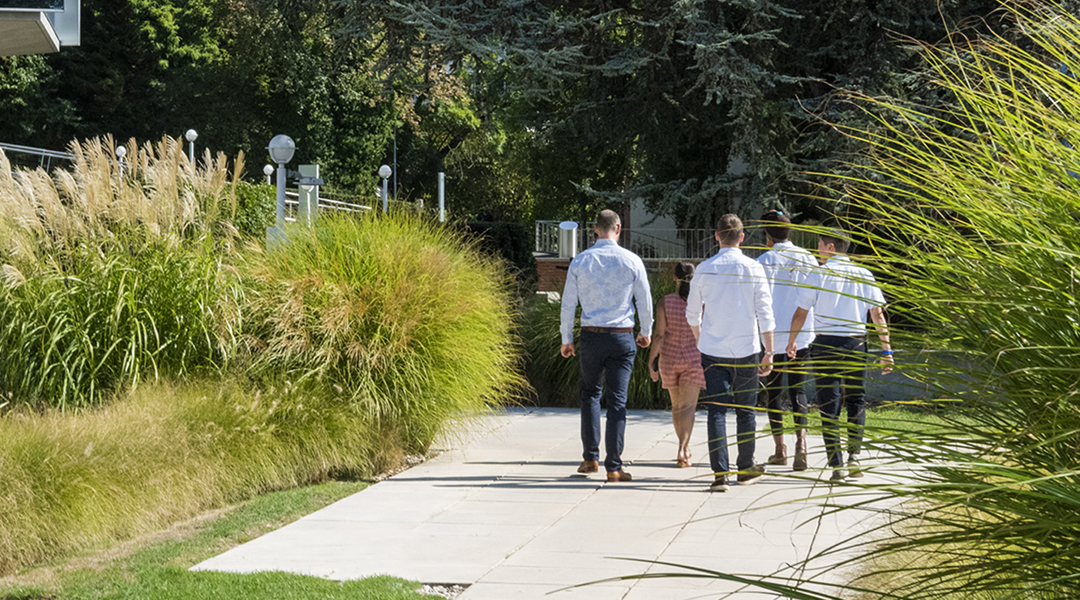
Impact investment has emerged as a natural vehicle for inclusive capitalism, as investors seek more responsible ways to harness value beyond low-yielding traditional financial markets. However, many impact entrepreneurs still struggle to attract the capital and the right kind of support to scale up, while investors can find it hard to pick winners or understand the realities and risks of the sector.
Peter Wuffli, Founder and Chairman of the elea Foundation for Ethics in Globalization, and IMD Professor Vanina Farber, co-authors of a new book on impact investing, The elea Way, argue that unlocking the potential of impact investment requires a new investor mindset and better integration between entrepreneurship and capital.
This webinar, led by Professor Farber and featuring Peter Wuffli, Founder and Chairman of the elea Foundation for Ethics in Globalization, appeared live on Wednesday, 16th December, 2020 at 15:00 CEST.
Greater collaboration in impact investment and beyond is necessary to drive change and to ensure that globalization benefits more people, according to elea Foundation Chairman Peter Wuffli, even if challenges remain in breaking down silos and building bridges based on trust.
“Collaboration is one of those fields that is underexploited and that should be pushed harder beyond the civil society sector to include corporations and public institutions,” the former Chairman and current Honorary Chairman of IMD said. “We do increasingly search for impact-oriented aligned ecosystems of diverse organizations, such as private companies and development finance organizations. Some examples are linking small holder farmers through technology with suppliers and service providers, or arranging for matched funding schemes between impact investors and development aid organizations.”
“There should be models where different organizations work together to build bridges and develop trust. This is an uphill battle. The more we can develop good examples of collaboration across these different sectors, the better off the world will be,” he said.
Wuffli established the elea Foundation in 2006 with the aim of fighting absolute poverty through entrepreneurial means. The foundation is engaged in philanthropic impact investment in agricultural value chains, informal retail and last mile distribution, employable skills building and digital solutions.
Farber explained that there were signs that a greater spirit of collaboration was gaining more traction in the field as decision makers from all walks of life begin to realize the need for co-creation to solve the world’s increasingly complex problems.
“The mindsets are not only changing at the corporate level about impact but also NGOs are thinking about efficiency, revenue streams and business models, so we are seeing much more common language,” she said.
Levelling the playing field in globalization
Wuffli argued that, while globalization had created many opportunities, it had clearly not benefitted everyone. This imbalance had inspired the elea Foundation’s focus on philanthropic impact investment, where it targets investments in young companies in their post start-up to early growth phase that are improving the lives and livelihoods of those living in absolute poverty. The foundation is active in Asia (e.g., India, Pakistan and the Philippines), Africa (e.g., Kenya, Zimbabwe, Tanzania and South Africa) and Latin America (e.g., Bolivia and Peru).
“If we don’t cater for those who did not have access to globalization’s opportunities, you may have processes that make globalization stop,” he said. “There are indications that some of this is happening. We really focus on helping those who did not have access to globalization opportunities.”
One example of successfully leveraging positive experiences across geographies was a program to support “Mom and Pop” neighbourhood shops in La Paz, Bolivia. With the help of an IMD consulting project with MBA students, elea ended up replicating it in Nairobi, with a hands-on approach that led to similar outcomes in a different cultural context.
Continuous learning and improvement is a hallmark of “The elea Way”, Wuffli said: “When you do one or two investments in a certain sector, you become an expert and learn a lot. It’s then much easier to assess a third investment with similar characteristics and position yourself with the entrepreneur as someone that can contribute relevant expertise.”
Helping entrepreneurs and investors bridge the divide
The elea model of philanthropic investment focuses on early stage companies that have found their footing but need support in terms of strategic, organizational and governance development as well as – particularly in times of Covid-19 – crisis management.
“As a rule of thumb, for every dollar of risk capital we invest, we invest approximately another dollar in advice, strategic development, organizational building and governance,” he said.
While many social enterprises struggled to have the structures in place to attract further finance, he said, it was also true that impact investors did not always know how to most effectively invest their money.
“We find many entrepreneurs who cannot deal with capital and impact funds who are not sure what impact is and what they should look for in due diligence and assessments of entrepreneurs,” he said. “At elea, we have been trying very hard over 15 years to bring entrepreneurs and capital together.”
Unlike venture capital in, say, Silicon Valley, impact investment does not offer big ticket wins that essentially pay for the failure of many other start-ups. Wuffli said more investors who could bear this start-up risk and commit resources to mentoring entrepreneurs were needed in impact investing.
“The difference between the area we work in and Silicon Valley is that we don’t have Apples and Amazons that bail out thousands of failed enterprises,” he said. “The industry is in need of more investment appetite into these kind of capabilities – leadership, planning and organizational skills.”
Digitalization has democratized impact investment
Wuffli explained that digitalization had transformed an impact investment space that now constitutes US$500 billion in committed capital and hundreds of funds, because it had made it easier to find and connect with social entrepreneurs around the world.
“When we started, our main sources were scouting tours, working with development organizations with a long established presence locally and then we had some increase in people who approached us,” he said. “With digitalization, they already have a website and Facebook or LinkedIn presence – it’s very easy, remotely, to find indications for social enterprises.”
The foundation now conducts research evenings where the team assesses hundreds of potential investments and shortlists 20-30 companies for further discussion and due diligence.
Farber said the elea Foundation had set an example to others of how to deliver effective impact investment by bringing together private capital with credible social innovation projects to inspire positive change.
Elea Webinar series 2020
Closing the last elea webinar of 2020, Professor Farber reminded participants that the elea Center for Social Innovation, in line with IMD’s overall vision, challenges what is and inspires what could be through social innovation.
She added that, through center activities such as these webinars, “we want to continue identifying and exploring the opportunities available to social innovators throughout the spectrum of capital: from profit-seeking impact enterprises to new uses of philanthropic capital.”
“We believe that we are at an important inflection point on the role of the private sector to lead towards a greener, more just, inclusive and prosperous society,” she said.
The elea webinar series has brought together diverse actors to engage in meaningful, thoughtful debate on how to tackle the most pressing social and environmental challenges, while opening a space for managers, activists and financiers to develop and express a stronger sense of purpose and have a greater positive impact on society. We look forward to picking up the webinar series and thought-provoking conversation again in 2021.
To find out more about upcoming webinars from the elea Center for Social Innovation, please visit the Center’s page here.











